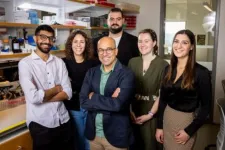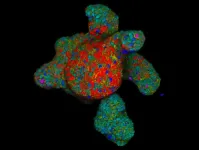(Press-News.org)
In its first three years of operation, Medicaid’s primary care-focused Accountable Care Organizations (ACOs) in Massachusetts showed “no clear evidence of success” in improving asthma care for children, according to research led by the University of Massachusetts Amherst and UMass Chan Medical School-Baystate Health.
The study, published recently in JAMA Pediatrics, compared the asthma care of Medicaid-insured children affiliated with a Medicaid ACO to that of children with private insurance. Senior author Dr. Sarah Goff, a practicing pediatrician and internist and professor of health promotion and policy in the UMass Amherst School of Public Health and Health Sciences, says she was “not terribly surprised” at the findings, in part because it was so early in the post-implementation time period , though she had hypothesized there might be some improvements in the outcomes measured.
“The goal of the Accountable Care Organizations is to improve healthcare value by improving quality of care and reducing costs or holding them steady,” she says, adding that Massachusetts’ Medicaid program is a leader in the nation, expanding their value formula to include patient experience. “But healthcare systems are really big and really complex. So when you introduce a major change in policy and the way care is delivered, three years is a fairly short time to see a lot of change, but it’s still really important to take a look at those first three years.”
More than one-third of the nearly six million children in the U.S. with asthma are insured with Medicaid, the paper notes. Asthma is poorly controlled for more than half of children with the disease. “Racial, ethnic, socioeconomic and geographic disparities in asthma quality of care and outcomes are large and persist despite interventions at the health system, state and national levels,” the paper states.
“Understanding the impacts of major changes to state Medicaid policy for children with asthma was particularly important because there are clinical treatments and strategies that we know work to improve asthma control. However, these are underused, particularly among those with Medicaid. This can result in high rates of emergency department use – which is not the ideal place for asthma care,” says Kimberley Geissler, formerly a UMass Amherst researcher and now an associate professor of healthcare delivery and population sciences at UMass Chan Medical School-Baystate.
The researchers examined Massachusetts insurance claims data between 2014 and 2020 for several asthma control markers: routine asthma visits, asthma medication ratio and emergency department/hospital care. In 2018, primary care-oriented Medicaid ACOs were launched in Massachusetts. Asthma medication ratio compares the use of controller medications, used on a regular basis, to rescue medications, used in an urgent situation when symptoms are not being controlled by the routine medication.
The study found no significant change in the rates of routine asthma visits for Medicaid and privately insured children after the implementation of ACOs, meaning that the insurance-based disparities persisted. There was a narrowing in disparities in the appropriate asthma medication rates. However, this was because the rate for privately insured children got worse, rather than the rate for children with Medicaid improving. “So it looks better, but it’s really not,” Goff explains.
For the third marker, the team found worsening disparities in emergency department/hospital use for children with Medicaid ACOs compared to children with private insurance.
“We don’t know why it looks like emergency visits went up,” Goff says. “One of the main foci of the Accountable Care Organizations is to improve care management and coordination,” which is in part designed to result in fewer visits to the hospital for care.
Goff and Geissler say more research is needed as Medicaid ACOs mature to determine the effects they may have on asthma quality of care, outcomes and disparities for children.
“The Massachusetts Medicaid program is a national leader in innovation to improve care delivery,” Geissler says. “It is very important to continue studying impacts of changes to the program over time to ensure that all children receive high-quality, accessible care so that they can thrive.”
END
FOR MORE INFORMATION
Michael San Filippo
Senior Media Relations Manager
American Veterinary Medical Association
Cell/Text: 847-732-6194
msanfilippo@avma.org
New study sheds light on lily toxicity in cats; outpatient treatment may be viable option
(SCHAUMBURG, Illinois) October 17, 2024—A study published recently in the Journal of the American Veterinary Medical Association (JAVMA) has revealed new insights into the treatment of cats exposed to toxic lilies, offering hope for pet owners facing this common household hazard.
The study (“Prevalence of acute kidney ...
Scientists hope that quantum computing will help them study complex phenomena that have so far proven challenging for current computers – including the properties of new and exotic materials. But despite the hype surrounding each new claim of “quantum supremacy”, there is no easy way to say when quantum computers and quantum algorithms have a clear and practical advantage over classical ones.
A large collaboration led by Giuseppe Carleo, a physicist at the Swiss Federal Institute for Technology (EPFL) in Lausane and the member of the National Center for Competence in Research NCCR MARVEL, has now ...
If you’ve ever struggled to reduce your carb intake, ancient DNA might be to blame.
It has long been known that humans carry multiple copies of a gene that allows us to begin breaking down complex carbohydrate starch in the mouth, providing the first step in metabolizing starchy foods like bread and pasta. However, it has been notoriously difficult for researchers to determine how and when the number of these genes expanded. Now a new study led by The University of Buffalo (UB) and The Jackson Laboratory (JAX) showcases how early duplications of this ...
The biosynthetic pathway of specific steroidal compounds in nightshade plants (such as potatoes, tomatoes and eggplants) starts with cholesterol. Several studies have investigated the enzymes involved in the formation of steroidal glycoalkaloids. Although the genes responsible for producing the scaffolds of steroidal specialized metabolites are known, successfully reconstituting of these compounds in other plants has not yet been achieved. The project group ‘Specialized Steroid Metabolism in Plants’ in the Department of Natural Product Biosynthesis, led by Prashant Sonawane, who is now Assistant ...
A major new study reveals that carbon dioxide (CO2) emissions from forest fires have surged by 60% globally since 2001, and almost tripled in some of the most climate-sensitive northern boreal forests.
The study, led by the University of East Anglia (UEA) and published today in Science, grouped areas of the world into ‘pyromes’ - regions where forest fire patterns are affected by similar environmental, human, and climatic controls - revealing the key factors driving recent increases in forest fire activity.
It is one of the first studies to look globally at the differences between forest ...
A new study shows that an artificial intelligence (AI) tool can help people with different views find common ground by more effectively summarizing the collective opinion of the group than humans. By producing statements that convey the majority opinion, while incorporating the minority’s perspective, the AI produced outputs that participants preferred—and that they rated as more informative, clear, and unbiased, compared to those written by human mediators. Human society is enriched by a plurality of viewpoints, but agreement is a prerequisite for people to act collectively. ...
The health of American democracy is facing challenges, with experts pointing to recent democratic backsliding, deepening partisan divisions, and growing anti-democratic attitudes and rhetoric. In this issue of Science, Research Articles, a Policy Forum, a Science News feature, and a related Editorial highlight how the tools of science and technology are being used to address this growing concern and how the upcoming U.S. presidential election could impact U.S. science.
In one research study in this special issue, Jonathan Chu and colleagues sought to understand whether understandings ...
As climate change promotes fire-favorable weather, climate-driven wildfires in extratropical forests have overtaken tropical forests as the leading source of global fire emissions, researchers report. The findings raise urgent concerns about the future of forest carbon sinks under climate change. Fire has long played a role in shaping Earth's forests and regulating carbon storage in ecosystems. However, anthropogenic climate change has intensified fire-prone weather, leading to an increase in burned areas and carbon emissions, particularly in forested regions. These fires not only reduce forests' ability to absorb carbon but also disrupt ecosystems, harm biodiversity, and pose significant ...
Studies of chemicals in our blood typically capture only a small and unknown fraction of the entire chemical universe. Now, a new approach aims to change that. In a study involving blood samples of pregnant women collected between 2006 and 2008, researchers report having quantified many complex mixtures of chemicals that may pose neurotoxic risks, even when the individual chemicals were present at seemingly harmless levels. “The quantification of 294 to 473 chemicals in plasma is a major improvement compared with the usual targeted analysis focusing on only few selective analytes,” wrote the authors. ...
A multi-institutional group of researchers led by the Hubrecht Institute and Roche’s Institute of Human Biology has developed strategies to identify regulators of intestinal hormone secretion. In response to incoming food, these hormones are secreted by rare hormone producing cells in the gut and play key roles in managing digestion and appetite. The team has developed new tools to identify potential ‘nutrient sensors’ on these hormone producing cells and study their function. This could result in new strategies to interfere with the release of these hormones and provide avenues for the treatment of a variety of metabolic or gut motility disorders. The work will be presented ...


